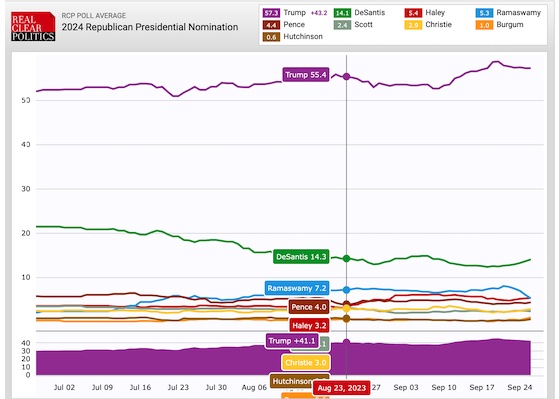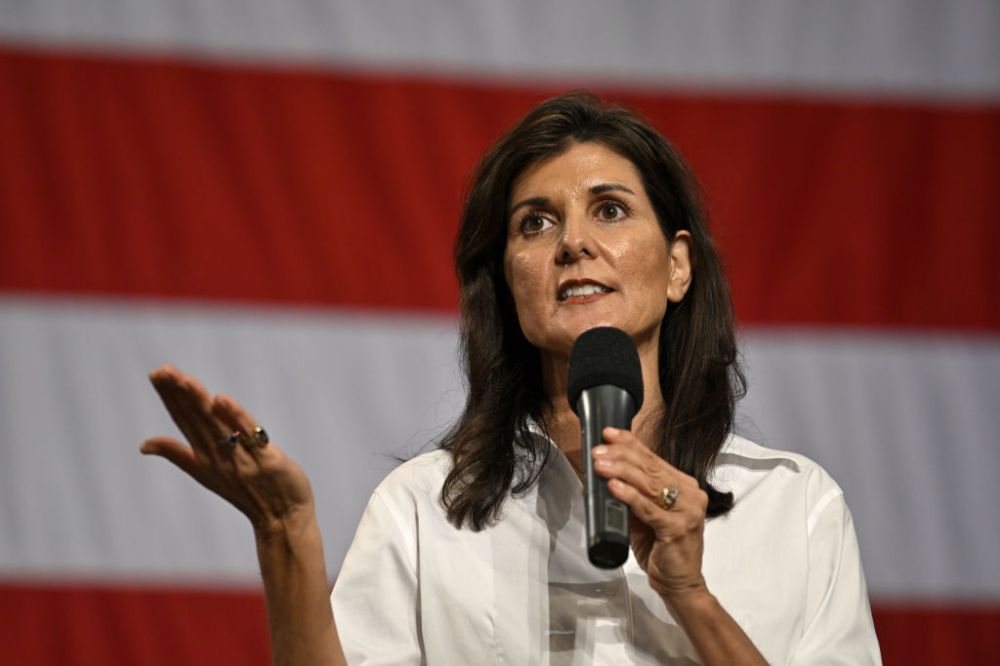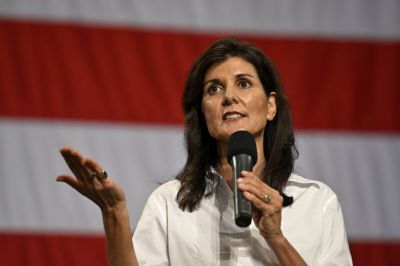Today we’re going to pretend that Wednesday night’s second Republican primary debate matters.
It won’t be easy. Have a look at the national polling since the first debate on August 23.

Trump’s lead, already north of 40 points when that debate was held, has grown a bit since.
Wealthy donors have begun to despair of finding a viable challenger. “Trump’s like 50 points ahead,” said one recently to Politico. “Who wants to get involved and waste money?” Outside groups are largely MIA, not wanting to make an enemy of the prohibitive favorite by spending against him, and some are unhappy about it. “Where were all these people who were speaking a big game [about stopping Trump] when it came time to put rubber on the road?” an adviser to another campaign complained to NBC News. “The bare minimum they could have done was make sure he was so damaged that he wasn’t sitting at 50% in the polls. But because they sat on their hands, they’ve essentially ceded the nomination to him, and it’s through inaction.”
Is that so? If only rich conservatives had dumped an extra $100 million on Ron DeSantis’ already lavishly funded super PAC, the cult of Trump that’s propelled him to a Saddam-like lead after four indictments would have cracked at last?
Forgive me for doubting that.
But now isn’t the time to point fingers. That’ll come this winter, after Trump cruises to a third nomination and anti-anti-Trump conservatives start grasping for rationalizations to continue supporting this rancid party. The donors failed, the outside groups failed, DeSantis failed—anything to escape the all but inescapable conclusion that a “very large portion” of the Republican base, in Mitt Romney’s words, “really doesn’t believe in the Constitution.”
That’s in the future. Right now, because the state of this race is so dreary and so dull in its dreariness, we’re going to liven things up by imagining that Wednesday’s debate might matter.
I think it might! Sort of?
In time we may look back and think of the second debate as “the consolidation debate.” That is, the moment when the GOP’s sizable Trump-leery minority began to unify behind a single challenger.
Unfortunately, that single challenger is unlikely to be Ron DeSantis.
I say “unfortunately” because I remain convinced that the governor of Florida is the only candidate with a theoretical path to victory over Trump. The MAGA base likes him and admires his culture-war achievements in Florida; the conservative rump of the party respects his intelligence and views him, correctly, as a low-bar upgrade over you-know-who in both his temperament and respect for civic norms. He’s the only candidate who can unite the two wings of the party and so, not coincidentally, he’s also the only candidate who led Trump in any primary polling over the past year.
He could have been a contender. But I think we’re firmly in the “past tense” phase of DeSantis’ contender status now.
For six weeks he’s been below 15 percent in national polling. He remains in second place in Iowa but has slipped further behind Trump there since the first debate. In South Carolina he’s fallen into a tie for third. And in New Hampshire he’s dropped to—deep breath—fourth, behind Chris Christie. He’s not even in double digits anymore.
Could all of this start to turn around tomorrow? Sure, hypothetically. But how? What could DeSantis say, realistically, that would persuade the 15 percent or so of Republicans who’ve ditched him for other candidates since early April to feel Ready for Ron again?
He has one important card to play. He’s going to put pro-life viewers on notice that Donald Trump thinks the six-week abortion ban DeSantis signed in Florida is a “terrible thing.” If you make Trump president again, the governor will tell them, he’ll sell out the anti-abortion cause by reaching some unacceptable compromise with Democrats. That warning might be worth something to the DeSantis campaign, especially in evangelical-heavy Iowa.
Or it might not.
For one thing, other candidates onstage like Mike Pence and Tim Scott will also take Trump to task for going wobbly on fetal life. (I hope.) If you’re an Iowa Republican who’s unhappy with Trump’s abortion comments but who feels lukewarm about DeSantis, you’ll have other options.
Even if that happens, though, we’re all far too jaded by now to expect Trump’s apostasy on abortion to cost him meaningful support in the primary. “In 2016, Trump had to hew to social-conservative orthodoxy to win the Republican nomination. Now, he may well define the orthodoxy,” Rich Lowry wrote recently. DeSantis’ campaign strategy was premised on that not being true, that Trump’s voters would gravitate to him as he got to the frontrunner’s right on policy—on “wokeness,” on vaccines, on regulating tech companies, and so on.
But Lowry is right. DeSantis’ strategy has, accordingly, failed at every turn. Voters don’t want the most populist or the most conservative candidate on the issues, it turns out. They want Trump and will massage their own policy preferences to accommodate him. Why would the issue of abortion be any different?
Wednesday night is more likely to be the beginning of the end for DeSantis than a new beginning. He won’t get the free pass from the rest of the field that he got at the first debate; Vivek Ramaswamy and Nikki Haley will each want to damage him for different reasons. And while his pro-life pitch could earn him a second look from less-Trumpy Republicans, I wouldn’t count on it: He’s lost 20 points among self-described moderates in New Hampshire since July, the bitter fruit of having spent nine months trying to outflank Trump on the right. I suspect those voters will find his six-week abortion ban in Florida either too draconian or, if not, insufficient to offset the many populist sins of which he’s guilty.
Or, maybe, they’ll do what voters usually do and form their opinions based on shallow intangibles like charisma or “likability” more so than minute policy differences. In which case there’s almost certainly nothing DeSantis can do to right the ship.
So if any consolidating is going to happen after debate two, it’s probably going to happen around Haley.
Nikki Haley is the only candidate beside Trump who’s gained in national polling since debate one. On August 23, she was at 3.2 percent. Today she’s at 5.4.
Not so impressive, particularly given the hype after the first debate about how strongly she performed. But if you look at the early-state polling, you’ll find signs of life. She’s in third place at 9 percent now in Iowa; in second at 14.7 percent in her home state of South Carolina; and at 13.7 percent in New Hampshire, also good for second. The New Hampshire result surprises me given how much time Chris Christie has spent there and how doggedly DeSantis’ campaign has tried to frame the primary as a two-man race, but Haley keeps chugging along. The latest poll of the state published on Monday also found her in second place at 15 percent with the second-highest net favorable rating of any Republican, behind only Tim Scott.
She’s already essentially supplanted DeSantis as Trump’s most formidable opponent in the states that count, in short, and it’s seemingly all because of the impression she made at the first debate on August 23. Against all odds, insofar as that event has now altered the trajectory of the primary, it turns out to have mattered.
The good impression she left appears to have mattered in another way. In two major polls lately, Haley has performed notably better head-to-head against Biden than any other Republican. If there’s a serious “electability argument” to be made in this primary, it’s hers rather than DeSantis’ to make.
The first poll was published earlier this month by CNN and found Haley leading Biden, 46-41. By comparison, Trump led the president by a point while DeSantis tied with Biden at 47 percent. This past weekend, NBC News corroborated that result: Their new survey has Haley 5 points up on Biden versus a dead heat for Trump and a 1-point deficit for DeSantis. Among college graduates and independents, she fared better than either of them.
The obvious caveat is that Trump has more baggage than a 747 and DeSantis has spent nine months being torn to shreds by MAGA diehards while no one has laid a glove on Haley. (Although that might be changing. She just got her first Trump nickname!) Once she starts taking flak for her less popular opinions, her margin over Biden should shrink. But for the moment, she’s fulfilling the promise of DeSantis’ candidacy. The governor of Florida vowed he’d be more electable than Trump but hasn’t proved it in head-to-head polling; the former governor of South Carolina has.
If her numbers against Biden remain lofty, they might begin to convince Republican voters that the party really does have a stronger nominee available than Trump. Electability matters! And I know someone who agrees:
I don’t mean to overstate Haley’s case. The first threshold of “electability” is winning a primary, of course, and as I said last week, I can’t imagine where a traditional conservative like her would find the votes to do that in an electorate like this one. I quote myself: “The Republican Party in 2023 is a party by and for demagogues. Nikki Haley isn’t a demagogue.” Her realistic best-case scenario is something like the short end of a 66-33 split with Trump.
But I do think it’s possible that she’ll ultimately consolidate the party’s Trump-leery vote, and that the process might begin on Wednesday night.
If she has another standout debate, roundhousing DeSantis for some of his populist excesses and batting around Ramaswamy on foreign policy like a cat playing with a mouse, traditional conservative voters spread among Pence, Scott, and Christie will begin to consider their options. Fat cats will perk up too. In fact, they already have. “I was with her in New York at a fundraiser last week and it was a room packed with major New York donors who were really hearing her for the first time,” one wealthy Haley supporter told the New York Times on Tuesday. “This is a pivotal week.”
Should Haley emerge again as the star of the debate, you can foresee a cycle of “good vibes” that becomes self-propelling. Some conservative voters in other camps will defect to her; her polls will go up, driving further media buzz about a Haley boomlet; donors will begin to swing away from DeSantis and toward her as the only non-Trump candidate in the race who’s shown signs of life in six months; that’ll drive further good buzz; and suddenly the perception might take hold that Nikki Haley is the only game in town for righties who want something different in 2024.
If Pence, Christie, and Scott begin shedding support, there’s even a chance she’ll persuade them to endorse her before Iowa, encouraging further consolidation of the non-Trump bloc. Remember, the pressure on also-rans to avoid the mistake of 2016 by getting out early this time and giving undecided Republican voters a binary “Trump or Not Trump” choice will be enormous. The debate is Haley’s chance to seize the “Not Trump” crown off of DeSantis’ head and begin moving toward that binary choice.
This should be the “DeSantis versus Haley debate,” then, and not just because the two are suddenly in a deathmatch for second place in the polls. No two candidates onstage better represent the two wings of the Trump-era GOP. On issue after issue, they’re opposed.
Entitlement reform? The populist DeSantis wants hands off while the conservative Haley thinks it’s time to start tweaking retirement ages.
Ukraine? The populist DeSantis doesn’t want to increase U.S. funding for the war effort or to see Ukraine admitted to NATO. The conservative Haley is a staunch Russia hawk who’s been calling for the country to join NATO for months.
A government shutdown? The populist DeSantis has been egging on House Freedom Caucus types to fight, fight, fight Kevin McCarthy until he meets their demands on spending. The conservative Haley thinks fighting to the point that the government shuts down is “irresponsible and inexcusable.”
The UAW strike? The populist DeSantis has been cagey but complained in an interview that Biden’s electric-vehicle incentives are a threat to the auto industry and its workers. The conservative Haley touted her “union-buster” credentials as governor and grumbled about the exorbitant pay raise the UAW is demanding: “When you have the most pro-union president and he touts that he is emboldening the unions, this is what you get.”
Abortion? That’s a little complicated.
At first blush, the roles are reversed here. It’s DeSantis who took the traditionally conservative position of signing a strict six-week ban into law in Florida whereas Haley has called for “consensus” at the national level, not unlike Trump babbling lately about a compromise between the two sides. But drill down on specifics and it’s harder to tell them apart. Haley thinks there’s a federal role for restricting abortion but is skeptical that the votes are there in Congress whereas DeSantis seems to favor a “bottom-up” federalist approach to the matter.
I think they’re both trapped on a tightrope, struggling to find a position that’s righteous enough for ardent pro-lifers without scaring away swing voters in a general election. And so they’ve arrived at roughly the same place, willing to crack down at the state level yet skittish about making any false moves federally. But that’s not to say they won’t clash on the subject on Wednesday: DeSantis might well challenge Haley on her “consensus” comments in order to get to her right among evangelical voters in Iowa. And Haley might double down on “consensus” in order to make herself a little more palatable to populist Republicans who aren’t as invested in the pro-life cause.
They have every policy reason and every strategic reason to attack each other. But that’s not true of the rest of the candidates onstage, who’ll need to make a hard choice.
If you’re Mike Pence, Chris Christie, or Tim Scott, do you go after DeSantis, Haley, or the absent Trump? DeSantis is the easier target from a policy standpoint since he’s a populist proxy for the frontrunner. If the setting for the debate—the Ronald Reagan Presidential Library in California—means anything, it should lead traditional conservatives to unite against the common populist enemy.
But DeSantis is no longer their first problem in the primary. He’s a fading star whereas Haley’s star is rising and threatening to take their conservative voters along with it. So, strategically, the best thing they can do to preserve what’s left of their viability is … to reenact the crabs-in-a-bucket scenario from 2016 by trying to tear Haley down before she runs away with the Trump-leery bloc.
That is to say, their goal tomorrow night might be to avert consolidation. Even though doing so will redound almost entirely to the benefit of Donald Trump and Ron DeSantis.
I’m not optimistic that they’ll lay aside their personal ambition and do the thing that’s best for the party and for the country because, well, how often has any member of this party done that over the last eight years? But in fairness, these aren’t ordinary Republicans: Mike Pence famously did the right thing at a critical moment once before and Chris Christie has gone further than practically anyone else in the party in opposing a second Trump term.
So maybe they’ll attack the demagogue who’s 50 points ahead of everyone instead of attacking the conservative who’s 5 points in front of them.
I believe in my heart and soul that, if we band together and behave selflessly, there are still enough classical liberals in this party to lose a “Trump versus Not Trump” primary by only 35 points. We can do it! It starts, perhaps, onstage tomorrow night.







Please note that we at The Dispatch hold ourselves, our work, and our commenters to a higher standard than other places on the internet. We welcome comments that foster genuine debate or discussion—including comments critical of us or our work—but responses that include ad hominem attacks on fellow Dispatch members or are intended to stoke fear and anger may be moderated.
With your membership, you only have the ability to comment on The Morning Dispatch articles. Consider upgrading to join the conversation everywhere.